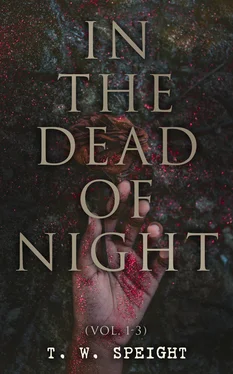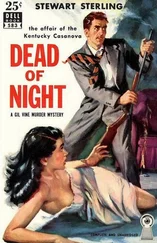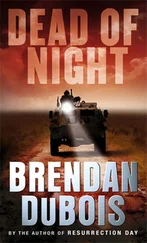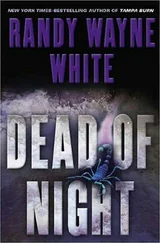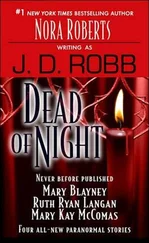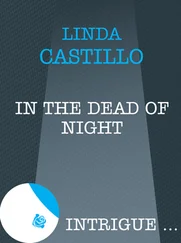T. W. Speight - In the Dead of Night (Vol. 1-3)
Здесь есть возможность читать онлайн «T. W. Speight - In the Dead of Night (Vol. 1-3)» — ознакомительный отрывок электронной книги совершенно бесплатно, а после прочтения отрывка купить полную версию. В некоторых случаях можно слушать аудио, скачать через торрент в формате fb2 и присутствует краткое содержание. Жанр: unrecognised, на английском языке. Описание произведения, (предисловие) а так же отзывы посетителей доступны на портале библиотеки ЛибКат.
- Название:In the Dead of Night (Vol. 1-3)
- Автор:
- Жанр:
- Год:неизвестен
- ISBN:нет данных
- Рейтинг книги:5 / 5. Голосов: 1
-
Избранное:Добавить в избранное
- Отзывы:
-
Ваша оценка:
- 100
- 1
- 2
- 3
- 4
- 5
In the Dead of Night (Vol. 1-3): краткое содержание, описание и аннотация
Предлагаем к чтению аннотацию, описание, краткое содержание или предисловие (зависит от того, что написал сам автор книги «In the Dead of Night (Vol. 1-3)»). Если вы не нашли необходимую информацию о книге — напишите в комментариях, мы постараемся отыскать её.
In the Dead of Night (Vol. 1-3) — читать онлайн ознакомительный отрывок
Ниже представлен текст книги, разбитый по страницам. Система сохранения места последней прочитанной страницы, позволяет с удобством читать онлайн бесплатно книгу «In the Dead of Night (Vol. 1-3)», без необходимости каждый раз заново искать на чём Вы остановились. Поставьте закладку, и сможете в любой момент перейти на страницу, на которой закончили чтение.
Интервал:
Закладка:
Lionel had not been many hours at Park Newton before he began to have visitors. The county families and neighbouring gentry who had known the late Mr. St. George either called or left their cards. Lionel was young and unmarried, and would be a decided acquisition to the limited circle of Midlandshire bachelors: that is to say, of eligible bachelors. Of ineligible bachelors there were always enough and to spare. But the advent of such a possible prize--of a bird with such splendid plumage as the new owner of Park Newton--was enough to send a pleasurable thrill through all the dovecotes within a circuit of twenty miles. Of the existence of a certain young lady, Edith West by name, nothing, of course, was known or suspected.
One of the first to call at Park Newton, and introduce himself to Lionel, was the Reverend John Wharton, the vicar of Duxley. Mr. Wharton was an octogenarian, but hale and hearty; as far as appearances went, he seemed likely to last for another twenty years.
"My having known your uncle, the late Mr. St. George, must be my apology for intruding upon you so soon," he said, as he shook Lionel warmly by the hand. "And not your uncle only, but your grandfather also. And now I should like to know you."
"You are very kind," said Lionel. "And I appreciate the honour you have done me."
"There was another member of the family, too, whom I recollect very well," said the vicar, as they sat together in the library. "I refer to your mother."
"Did you know my mother?" asked Lionel, eagerly.
"I did indeed. I remember her first as a sweet slip of a girl, playing and romping about the house and grounds. Then I missed her for three or four years while she was away at school. Then she came back, a sedate young lady, but very, very pretty. How fond your grandfather was of her! But he never forgave her for running away and marrying your father--never, that is, until he lay dying."
"Do you mean to say, sir, that my grandfather ever did forgive my mother?"
"Certainly he forgave her, but not till he lay on his deathbed. I was in the room at the time and heard his words. Taking your uncle's hand in his, your grandfather said--and his words came very slowly and feebly:--'Arthur, life and its duties look very different, as I lie here, from what they did when I was in health. It lies on my conscience that I never forgave poor Dorothy. It's too late to send for her now, but send her my blessing after I'm gone, and say that I loved her to the last.' He shut his eyes, and was silent for a little while. Then he spoke again. 'Arthur,' he said to your uncle, 'is it your intention ever to marry?' 'I shall never marry, father,' was the answer. 'Then who's to have Park Newton, after your time?' 'It will not go out of the family, you may depend upon that, father,' said your uncle. 'Some time or other it will have to go to one of the two boys,' resumed your grandfather; 'either to Dorothy's boy, or to Geoffry's son, Kester. Now I don't want to tie you down in any way, Arthur, but I confess I should like Dorothy's lad to have Park Newton. He could change his name to St. George, you know. Young Kester might have a life allowance out of the estate of two or three thousand a year, and there would still be enough left to keep up the old place in proper style. I feel that I have acted wrongly to Dorothy. There is some reparation due to her. If I thought that her boy would one day have the estate, I think I should die happier.' 'Father, it shall be as you wish,' said Arthur St. George, solemnly."
"A promise that was made only to be broken," said Lionel, bitterly. "I have heard my mother say that the first intimation she had of my grandfather's death was derived from the columns of a newspaper. Further than that, my uncle Arthur never wrote a single line to my mother; never would even see her; never hold any communication with her, direct or indirect, to the last day of her life."
"You shock me," said the old clergyman. "Can that indeed be true?"
"I tell you, sir," said Lionel, "that this is the first time I ever heard of any such wish having been expressed by my grandfather. Two months ago I had no more expectation than you had of ever coming into the Park Newton property. My cousin Kester was always looked upon as the heir."
"He was, greatly to my surprise, knowing what I knew. Your uncle adopted him and brought him up as his own son."
"And, had it not been for some mysterious quarrel that took place between my uncle and my cousin, Kester St. George would undoubtedly at this moment have been the owner of Park Newton."
"What you say seems only too probable," said the vicar. "And yet I always looked upon Mr. St. George as one of the most conscientious of men, as he was, undoubtedly, one of the most charitable."
"A pity that in this case his charity did not begin nearer home," said Lionel. "That must have been a terrible quarrel," he added presently, "which could induce my uncle to alter the determination of a lifetime, and leave the property away from my cousin."
"True," said the vicar. "I have often wondered of what nature it could be. But Mr. St. George never spoke of it to any one. He was a very close man in many ways."
There was much food for thought in what Mr. Wharton had just told Lionel. "My grandfather intended me to have Park Newton, and I've got it," he said to himself, after the vicar had gone. "But it was also his wish that Kester should have two or three thousand a year out of the estate. I'll write to Perrins to know how it can be done."
Mr. Perrins had gone back to London a few hours previously. Lionel wrote to him by that night's post. Next morning but one he had the following answer: "By the terms, of your uncle's will and codicil you have no power to make any such allowance out of the estate as the one suggested by you. You can, of course, make any allowance you may please, and to anybody, privately, and as a gift out of your own pocket; but it is not competent for you to burden the estate with any charge of such a nature."
Would his cousin accept three thousand a year from him as a gift? It was a delicate proposition to put to a man circumstanced as was Kester St. George.
Lionel had not been many days at Park Newton when he was called upon by Mr. Cope, the banker, with whom came Mr. Culpepper of Pincote.
Mr. Cope was the senior partner in the firm of Sugden and Co., the well-known, bankers of Duxley. The late Mr. St. George had had an account with the firm for twenty years, which account Mr. Cope was desirous of still retaining on his books, with nothing but a simple alteration of the customer's name.
Squire Culpepper was a friend of Mr. Cope, and had been an intimate friend of Mr. St. George; consequently, it was only natural that he and the banker should drive over to Park Newton together. Lionel gave them a hearty welcome. The banker was successful in the particular object of his visit, and was further gratified by Lionel's acceptance of an invitation to dine with him, en famille, the following day.
"Pincote ought by rights to have been your first place of call," said Mr. Culpepper to Lionel as he was bidding him goodbye. "But Cope here has stolen a march on me, as usual. However, I'll forgive him if you'll come and see us at Pincote before this day week."
Lionel laughed and promised.
Mr. Cope was a heavily-built, resolute-looking man of middle age, with a brusque business manner, which had become so confirmed in him by habit that he could not throw it off in private life. He had neither the education nor the manners of a well-bred gentleman, but he inspired respect by the shrewdness of his intellect, and a certain innate force of character which made itself felt by all with whom he came in contact. His father had originally been office-boy to the firm of Sugden and Co., but, in the course of thirty years, had gradually worked his way up to the honourable post of managing clerk. Ultimately, three or four years before his death, he had been elevated to a junior partnership. Already young Horatio Cope, although merely filling the position of an ordinary clerk in the bank, had displayed such natural aptitude as a financier that, when his father died, the vacant post was at once given him, and the firm had never had reason to regret the choice thus made. As time went on, the two oldest members of the Sugden family died within a few months of each other. Two or three years later the youngest of the three brothers was accidentally drowned. Of the original firm there then were left but two young men, of three or four and twenty, cousins, who knew little or nothing about the business, who were rich enough to live without it, and who preferred a life of ease and pleasure to the cares and toils which must devolve on those who would successfully steer a large financial concern through the troubled waters of speculation. In this crisis all that could be done was to fall back on Horatio Cope. He was master of the situation, and he knew it. The result was that he was offered a partnership in the firm on equal terms with the two cousins. They were to supply the capital necessary for the conduct of the business, but the entire management was to devolve on him. All this had happened several years ago; and in Duxley and its neighbourhood few men were better known, or more generally esteemed, than Mr. Cope.
Читать дальшеИнтервал:
Закладка:
Похожие книги на «In the Dead of Night (Vol. 1-3)»
Представляем Вашему вниманию похожие книги на «In the Dead of Night (Vol. 1-3)» списком для выбора. Мы отобрали схожую по названию и смыслу литературу в надежде предоставить читателям больше вариантов отыскать новые, интересные, ещё непрочитанные произведения.
Обсуждение, отзывы о книге «In the Dead of Night (Vol. 1-3)» и просто собственные мнения читателей. Оставьте ваши комментарии, напишите, что Вы думаете о произведении, его смысле или главных героях. Укажите что конкретно понравилось, а что нет, и почему Вы так считаете.
